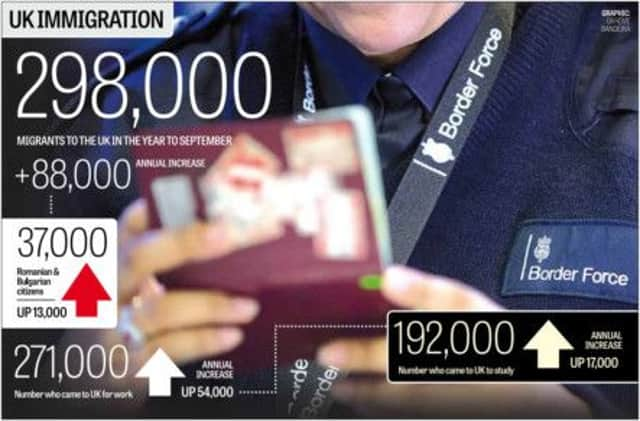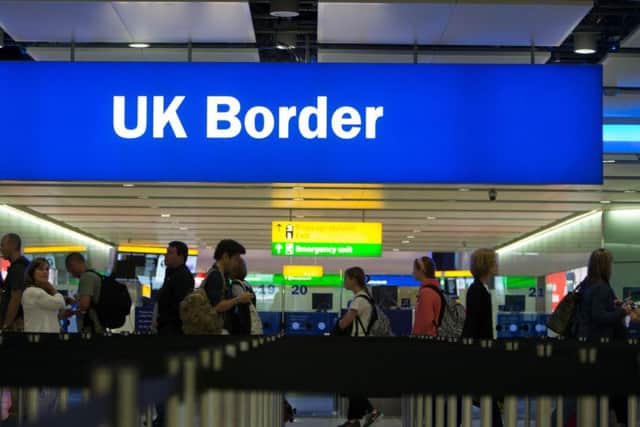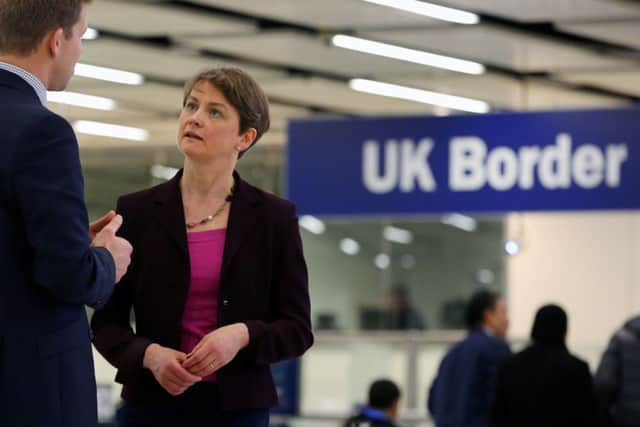In shreds: Cameron’s pledge to reduce immigration


There was a net flow of 298,000 migrants to the UK in the year to September, equal to the population of a city roughly the size of Nottingham and up from 210,000 in the previous 12 months, according to the Office for National Statistics (ONS).
The increase in net migration was driven by a “statistically significant” rise in immigrants arriving in the UK - up to 624,000 in the year to September from 530,000 in the previous 12 months. Around 327,000 people emigrated from the UK in the same period.
Advertisement
Hide AdAdvertisement
Hide AdToday’s figures are the final nail in the coffin for the promise made by Prime Minister David Cameron and Home Secretary Theresa May to slash net migration to below 100,000 by the end of the current parliamentary term.


There were significant increases in immigration of non-EU citizens - up 49,000 to 292,000 - and European Union citizens - up 43,000 to 251,000.
Experts flagged another statistically significant increase in Romanian and Bulgarian citizens arriving in the UK - up to 37,000 from 24,000 in the previous 12 months.
Of these, 27,000 were coming for work, a rise of 10,000 on the year ending September 2013, the ONS added.
Advertisement
Hide AdAdvertisement
Hide AdAround 271,000 people came to the UK for work, up 54,000 on a year earlier, while immigration for study rose from 175,000 to 192,000.


Madeleine Sumption, director of the Migration Observatory at the University of Oxford, said: “UK job growth is likely to be a key factor behind the recent increases.
“If the UK’s economic performance compared to the rest of the EU had been poor, then we might well have seen net migration fall, but that has not happened.
“Rising work-related migration from outside the EU has also contributed.”
Advertisement
Hide AdAdvertisement
Hide AdSunder Katwala, director of the British Future think-tank, said: “The ONS statistics have become a quarterly reminder to the public of why they don’t trust politicians on immigration, thanks to the net migration target.


“If the Prime Minister remains in denial about the broken target, he is setting himself up for five more years of failure. It is already clear there is next to no chance of meeting the same target in the next parliament either.”
Migrants’ Rights Network director Don Flynn said: “The latest migration figures reflect Britain’s growing economy and should not be used by the political parties as a launch-pad for their negative political campaigns shifting the blame for wider problems on to migrants.
“What these numbers show is that Britain is more than ever an outward-facing, globalised country with a diverse and hardworking population from overseas.
Advertisement
Hide AdAdvertisement
Hide Ad“However, we fear that the political debate ahead of the general election will fail to reflect that contemporary reality in any meaningful way.”
Deputy Prime Minister Nick Clegg said the Tories would have to “suffer the embarrassment of having ... failed spectacularly to deliver”.
“I said to David Cameron he shouldn’t make the commitment because it was inevitable he was going to break it because you can’t control the net figure,” he said on his weekly LBC radio phone-in.
Immigration and security minister James Brokenshire said: “Uncontrolled, mass immigration makes it difficult to maintain social cohesion, puts pressure on public services and can force down wages.
Advertisement
Hide AdAdvertisement
Hide Ad“That’s why this Government is working to reduce net migration - and why today’s figures are clearly so disappointing.
“As we have said for some time, we have been blown off course by net migration from within the EU, which has more than doubled since 2010.
“That’s why we need to continue to crack down on the abuse of EU free movement and continue our reforms to make our welfare system fairer and less open to abuse. We have scrapped housing benefit for EU jobseekers, have limited benefits claims for EU migrants with no prospect of a job - and the Prime Minister has set out our plans for further reform.
“We also need to make sure those people who come to the UK on time-limited visas, such as students, do leave at the end of their visa.
Advertisement
Hide AdAdvertisement
Hide Ad“But while these factors have pushed overall numbers back up, the immigration system today is a very different one to the one we inherited in 2010 thanks to this Government’s reforms.
“Our reforms are geared towards an immigration system which works in the national interest - attracting skilled migrants for occupations where we need them instead of unskilled workers who drive down wages, and genuine students for our world-class universities instead of bogus colleges, more than 850 of which we have closed down since 2010.
“Our landmark Immigration Act is making made it much tougher for illegal immigrants to remain in the UK by restricting access to work, housing, benefits, healthcare, bank accounts and driving licences - and the introduction of exit checks will help us to ensure that people leave the country when their visas have expired.
“The immigration system we inherited was open to widespread abuse and gave little consideration to whether migrants could support themselves or contribute to the UK when they arrived.
Advertisement
Hide AdAdvertisement
Hide Ad“We are building a system that is fair to British citizens and legitimate migrants and tough on those who abuse the system or flout the law - but we know there is much more to do.”
A Downing Street spokeswoman said: “The Prime Minister is disappointed with today’s figures.
“He had said previously that we have not made as much progress as he would like but he had also said that he doesn’t regret making this commitment because he thinks it is in the interests of our country, that we will have a better, stronger country, if we have lower net migration.”
Downing Street said the rise in immigration was driven in part by Britain’s economic success relative to its neighbours in the eurozone.
Advertisement
Hide AdAdvertisement
Hide AdA No 10 spokeswoman declined to comment on whether Mr Cameron would repeat his pledge to reduce immigration to tens of thousands, but said the effort to reduce numbers was “going to be a challenge for the next parliament”.
Asked if Mr Cameron continued to have confidence in Mrs May, the spokeswoman said: “He absolutely has confidence in the Home Secretary. He thinks she is doing an excellent job.”
The Downing Street spokeswoman told a regular Westminster media briefing: “The Prime Minister recognises the concern that British people have about immigration. That’s why he has made very clear that the Government is committed to reducing net migration and it is why this Government has taken the action it has to crack down on both migration from outside the EU and from within the EU.
“Of course, the figures out today show that there is still more to do. It underlines the challenges that there are. They are disappointing figures.
Advertisement
Hide AdAdvertisement
Hide Ad“The Prime Minister continues to stand by the record of this Government as to delivering action to reduce net migration.”
Asked whether the Prime Minister now regarded getting net migration below 100,000 as a target or merely an aspiration, the spokeswoman said: “The point here is ‘Is the Prime Minister committed to doing all he can to reduce net migration because he thinks it’s in the interests of the country?’. Yes he is.”
The spokeswoman said that net migration from outside the EU was down 28,000 since the coalition came to power.
The figures showing a rise in EU migration demonstrated “the challenge of the UK having a successful and growing economy at a time when many of the eurozone economies are stagnating”, she said. “I don’t think that was a factor anyone was predicting in 2010.”
Advertisement
Hide AdAdvertisement
Hide AdDespite publicity surrounding migration from new EU member-states, a “large percentage” of those coming to the UK were from the 15 countries which were members prior to 2004, she said.
“If you look at countries like Spain, with extremely high unemployment rates, people there are going to be looking at where else they can go to work and if you have a successful and growing economy - the fastest of the major economies last year - then that is another challenge you’re dealing with,” said the spokeswoman.
Challenged over whether the publication date had been chosen in the hope of “burying bad news” on the day of the release of a high-profile report into Jimmy Savile, the spokeswoman said it had followed “a long-standing process” for arranging government announcements.
She added: “It’s clear that both issues are getting prominent coverage today.”
Advertisement
Hide AdAdvertisement
Hide AdAnswering questions from MPs in the Commons, William Hague said rising immigration was a “problem of success”.
He said: “This is of course an important issue ... part of what we are seeing at the moment is the impact of this country having a dramatically stronger economy than in the rest of Europe, which then is producing more migration into the UK.
“In that sense it is a problem of success but of course it remains an important issue.”
Shadow home secretary Yvette Cooper said Mr Cameron’s immigration target was “now in tatters”.
Advertisement
Hide AdAdvertisement
Hide Ad“’No ifs, no buts’ was the Prime Minister’s promise,” she said. “I do think it’s a bit disgraceful that Theresa May hasn’t come out to respond today when the Government has made such big capital out of this being their promise and their pledge and now you have got this huge gap between the rhetoric and the reality, which does undermine confidence, inevitably, in the whole system.”
She told BBC Radio 4’s The World At One: “Of course immigration is important and we need top talent, but it has got to be controlled and managed so that the system is fair.
“I don’t think it works as an excuse for the Government to say ‘Oh well, the economy’s growing’ because actually it’s growing much later than they claimed it would.
“It has not been an economic success, this parliament, and they knew about economic growth when they made their pledge in the first place.”